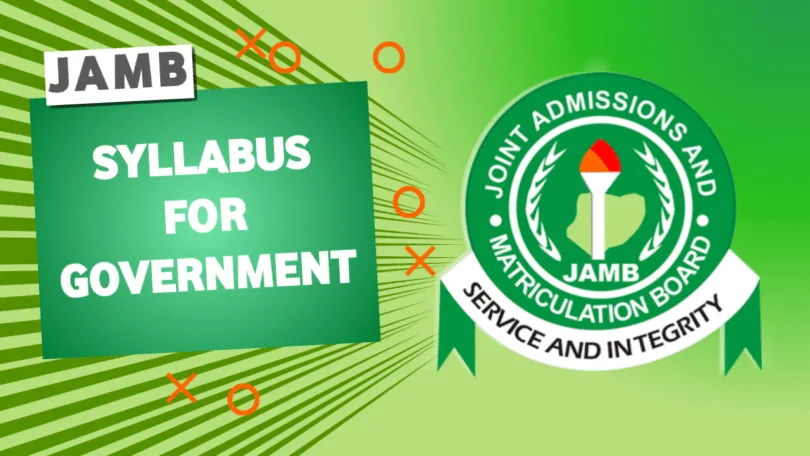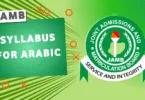The JAMB Syllabus for Government serves as a comprehensive roadmap for candidates preparing for the Unified Tertiary Matriculation Examination (UTME) in the 2026/2027 academic session. This essential document, released by the Joint Admissions and Matriculation Board (JAMB), outlines the key topics, objectives, and recommended study materials to ensure students focus on relevant content.
By adhering to the JAMB Syllabus for Government, aspirants can build a strong foundation in political concepts, Nigerian governance, and global political dynamics, ultimately improving their performance in the exam.
| Examination Type | UTME / Direct Entry |
| Examination Year | 2026 |
| Syllabus | Government |
| File Format | |
| File Size | 156 KB |
Government as a subject in the UTME emphasizes understanding political systems, ideologies, and institutions that shape societies. It equips students with analytical skills to evaluate governance structures and civic responsibilities.
For the 2026/2027 session, the syllabus remains largely consistent with previous years, with minor updates to reflect contemporary issues like digital governance and international relations. Candidates are encouraged to use this syllabus to structure their study plans, prioritizing high-yield topics while practicing with past questions.
Importance of the JAMB Syllabus for Government
Studying according to the JAMB Syllabus for Government helps candidates avoid irrelevant materials and concentrate on examinable areas. It promotes efficient preparation by breaking down complex themes into manageable sections. For instance, topics on Nigerian constitutional development are tested frequently, making them crucial for scoring well. The syllabus also aligns with the Computer-Based Test (CBT) format, where questions assess both factual recall and critical thinking. Regular review of this document can boost confidence and reduce exam anxiety, leading to better scores and admission prospects into tertiary institutions.
Detailed Topics and Objectives
The JAMB Syllabus for Government is divided into several broad sections, each with specific subtopics and learning objectives. Below is a table summarizing the main sections, key subtopics, and corresponding objectives. This structure allows for organized preparation, ensuring comprehensive coverage.
| Section | Key Subtopics | Learning Objectives |
|---|---|---|
| Basic Concepts in Government | Definition and scope of government; Types of government (democracy, autocracy, oligarchy); Power, authority, and legitimacy; Political socialization and political culture. | Candidates should explain the meaning of government and its functions; identify and differentiate forms of government; analyze sources of political power and the role of socialization in shaping political attitudes. |
| Constitutions | Meaning and sources of constitutions; Types (written/unwritten, rigid/flexible); Amendment processes; Separation of powers; Rule of law. | Students will describe constitutional features and compare types; evaluate the importance of checks and balances; discuss the principle of rule of law and its application in modern states. |
| Fundamental Principles of Government | Sovereignty (internal and external); Federalism; Checks and balances; Bill of Rights; Public accountability. | Aspirants should define sovereignty and its implications; examine federal structures in Nigeria and elsewhere; assess mechanisms for ensuring government accountability. |
| Political Ideologies | Capitalism, socialism, communism, fascism; Feudalism; Nationalism; Conservatism and liberalism. | Learners will compare ideological principles; analyze their impact on policy-making; relate ideologies to historical and contemporary events. |
| Nigerian Political History (Pre-Colonial to Present) | Pre-colonial systems (Igbo, Hausa-Fulani, Yoruba); Colonial administration (amalgamation, indirect rule); Nationalist movements; Independence and republicanism; Military rule eras; Second Republic to Fourth Republic; Current democratic challenges. | Candidates must outline traditional political systems; trace colonial policies and independence struggles; evaluate military interventions and civilian transitions in Nigeria. |
| Public Administration | Civil service structure; Bureaucracy; Public corporations; Local government systems; Public policy formulation and implementation. | Students should describe administrative hierarchies; discuss bureaucratic functions and reforms; analyze the role of local governments in development. |
| International Organizations | United Nations (structure, functions); African Union; ECOWAS; Commonwealth; OPEC; Roles in conflict resolution and economic cooperation. | Aspirants will identify organizational aims and organs; evaluate contributions to global peace; assess Nigeria’s involvement in regional bodies. |
In addition to these core areas, the syllabus encourages practical application. Candidates are expected to link theoretical knowledge to real-world scenarios, such as analyzing electoral reforms or foreign policy decisions.
The total exam comprises 50 multiple-choice questions, allocated 40 minutes, with topics weighted based on their significance. High-weightage areas include Nigerian history (about 30%) and basic concepts (20%), so allocate study time accordingly.
Preparation Strategies
To maximize benefits from the JAMB Syllabus for Government, adopt a systematic approach. Begin by reviewing the table above to identify strengths and weaknesses. Dedicate weekly sessions to each section, using mind maps for ideologies and timelines for historical events. Practice with timed mock exams to simulate CBT conditions. Group study can enhance understanding of abstract topics like federalism. Consistent revision, especially in the final months, reinforces retention. Remember, the goal is not just memorization but the ability to apply concepts critically.
Government JAMB Recommended Textbooks
While the syllabus lists specific books, focus on accessible ones like “Essential Government” by C.C. Dibie for comprehensive coverage of Nigerian politics, and “Round-Up Government” by A.O. Adetunji for concise summaries. These texts align directly with the JAMB Syllabus for Government, offering practice questions and case studies.
How to Download the JAMB Government Syllabus 2026 PDF
Downloading the syllabus is simple:
- Click on the download link provided on this page.
- Save the PDF file to your phone or computer.
- Access it anytime for offline study.
READ ALSO: JAMB Syllabus for Fine Art 2026/2027 | Download PDF
FAQs
What is the main focus of the JAMB Syllabus for Government?
The JAMB Syllabus for Government primarily covers political theories, Nigerian governance history, and international relations, aiming to develop informed citizens.
How many sections are in the JAMB Syllabus for Government?
There are seven main sections, ranging from basic concepts to international organizations, as outlined in the preparation table.
Does the 2026/2027 syllabus differ from previous years?
The core structure remains the same, with possible minor additions on contemporary issues like e-governance, but no major overhauls.
How can I use the table in this guide for studying?
Refer to the table to prioritize topics; match subtopics to objectives and track progress section by section for balanced preparation.
Are past questions based strictly on the JAMB Syllabus for Government?
Yes, JAMB questions derive directly from the syllabus, so aligning your study with it ensures relevance to exam content.
What if I miss a section in my preparation?
Prioritize high-weightage areas like Nigerian history first, then revisit others; use summary notes to catch up quickly.





